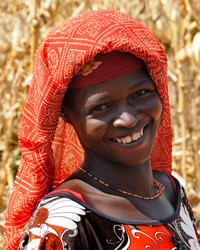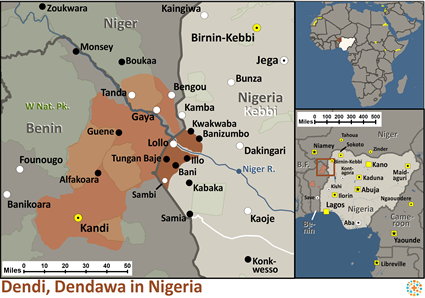The Dendi live in the northern parts of Benin, as well as in Togo, Nigeria, and Niger. Of these countries, they are least populous in Nigeria. They are a subgroup of the Songhai people of West Africa and speak a Songhai language. They trace their origin to the great Songhai Empire of the sixteenth century. Many years ago, the Dendi traveled as merchants throughout the Niger River Valley, selling their goods and services and settling along the principal caravan routes. Today, they have become an influential group with significant political influence in regional politics. In some of the larger cities, the Dendi form a very powerful commercial elite. Many continue to work as merchants, while others are farmers.
Most of the Dendi in Nigeria are farmers, growing maize, millet, and plantains. Most farming is done by the men only. Women, however, grow vegetables and herbs in their own personal garden plots inside their villages. The surplus produce from these gardens covers the cost of such necessities as tools, clothing, and expenses for birth and marriage ceremonies. Many Dendi also raise animals such as cattle, camels, sheep, goats, and chickens. In contrast to their southern neighbors, the Dendi milk their cows and goats, and make butter from the milk. Regular markets exist on both local and regional levels, with the caravan trade still playing an important role in the Dendi economy. Cotton fabrics, leather goods, kola nuts, salt, dried fish, and other articles are among some of the items traded. Each Dendi village is composed of an extended family linked to a common male ancestor. This group is then divided into sub-groups and further into household units. Each household unit consists of a married son, his wives and their children. Many men have more than one wife, and each wife has her own hut. There, she will raise her children until they marry or are old enough to move out on their own. The first wife enjoys a privileged status and is considered the "chief" over the other wives. Marriage raises a man to a senior status; therefore, most men do not usually marry until they are in their late twenties. Girls, on the other hand, marry while in their early teens. All children belong to the husband's lineage group, even in cases of divorce. In the rural areas, individual huts of a household unit are round and made with mud or mat walls and have round, thatched roofs. In the larger towns and cities, however, houses are rectangular and have sun-dried brick walls and roofs made of beaten earth. An interior courtyard is located in the center of these houses and is used as a place to keep the animals, store grain, and receive guests. A number of these houses together forms a household unit, which is fortified or protected with walls of brick or stone laid in mud. The Dendi have intermarried with the local peoples in the regions in which they live. In some ways, such as religion, the Dendi have become indistinguishable from them.
Like other Songhai groups, the Dendi in Nigeria are completely Muslim. The clothes they wear, the calendar they follow, the naming of their babies, and the wake for the dead follow the same customs practiced by Muslims around the world. Most Dendi live in rural areas and keep some of their traditional religious practices in conjunction with Islam. The belief in natural forces and spirits forms the basis of their ethnic religion. They still depend on elders and specialists, who they believe are able to tell the secrets of nature and spirits.
The Dendi New Testament has been translated into their language. Still, the great majority have never had an opportunity to hear the gospel. More evangelistic work and further prayer are needed to bring the gospel into their lives.
Ask the Lord of the harvest to send additional laborers to join the few who are already working among the Dendi of Nigeria. Ask the Holy Spirit to anoint the efforts of mission agencies focusing on the Dendi. Pray that Christian radio broadcasts will be made available to the Dendi. Pray for a powerful Disciple Making Movement among the Dendi people in Nigeria this decade.
Scripture Prayers for the Dendi, Dandawa in Nigeria.
| Profile Source: Joshua Project |


























